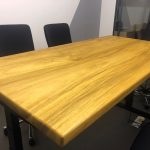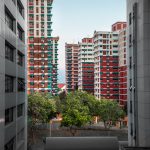If you are not sure about what shows to watch at the M1 Singapore Fringe Festival this year, we’re here to help!
Back from 16 to 27th January 2019, its second instalment of themes inspired by iconic Singaporean artists and their signature works will be curated around the theme Still Waters, taken from the title of a seminal work by groundbreaking Australia-based Singaporean artist Suzann Victor.
Still Waters was first presented within a drain at the Singapore Art Museum as a site-responsive performance in 1997.
The museum had been retrofitted with a glass wall around the building to control its internal climate and in doing so a liminal space was created between the wall and the external elements. Glass dams were installed for the performance that reversed the original purpose of the drain and filling the performance space with water. The water representing the unwanted that was meant to be concealed.

Image courtesy of the artist
Still Waters was performed during the de facto ban on Performance Art in Singapore from 1994 to 2004 and was one of the first few Performance Art works that tackled the issues surrounding the ban on funding for the art form.
More than 20 years on, Still Waters still evokes questions and tensions that remain about the politics of art, the body and public space in Singapore, estrangement and reconciliation, and the “remaking of histories”.
In responding to Still Waters, various artists in the Fringe line-up offered works which seek to reclaim alternative or suppressed histories and memories —personal, cultural and political.
The festival will be presenting 13 events, by artists and groups from Singapore and around the world, responding to the theme of Still Waters.
Here are some stellar works to catch at the festival:
A Fortunate Man

Photo credit: Julian Hughes
50 years ago, the visionary writer John Berger and photographer Jean Mohr published A Fortunate Man, which followed the daily life of English country general practitioner John Sassall, witnessing his compassion, and meditating on the role of a doctor.
15 years after the book’s publication, Sassall took his own life. His passing raised questions about the mental health strain on healthcare professionals, an issue that is still very pertinent today.
Taking this tragic event as a starting point, theatre company New Perspectives teams up with acclaimed theatre maker Michael Pinchbeck to create an expressionistic explosion of the book—a powerful interrogation about the passions and pressures of being a doctor in the modern world.
Above The Mealy-Mouthed Sea

All photo credits: Camilla Greenwell
A woman stands in front of a microphone. She can’t remember the punchline.
Using the imagery of water as its starting point, Above the Mealy-Mouthed Sea explores the volatile sensation of memory and the waves of emotions associated with them.
Fusing poetry and song, award-winning UK theatre company Unholy Mess presents a funny, strange and poignant play about growing up and the legacy of abuse.
Kaspar

Photo credits: Ryan McGuire
“I want to be someone like somebody else was once.” These words echo in Kaspar’s mouth, as he drowns in his estranged reality.
The true story of Kaspar Hauser is a fascinating one. He was found wandering the streets of Nuremberg, Germany one day in 1828 with nothing more than the slightly unkempt clothes and shoes on his back and a cryptic letter in his hand. There was no trace of where he could have come from or what his story was.
Needless to say, the story of the mysterious boy captivated many and was eventually adapted into one of the most highly acclaimed plays by Peter Handke.
precise purpose of being broken

Photo by Tuckys Photography, Courtesy of Esplanade – Theatres on the Bay
precise purpose of being broken is a multi-lingual work that features characters that are as broken as they are illuminated, and as doomed as they are hopeful.
Adapted from a collage of texts by playwright and Cultural Medallion recipient Haresh Sharma, each of these texts floats in a particular and specific universe: open, disembodied, yet inexplicably connected. It was first presented by Esplanade – Theatres on the Bay as a work-in-progress for The Studios: RAW in 2017.
Directed by Koh Wan Ching, this new presentation of precise purpose of being broken will be performed by Chelsea Crothers, Chng Xin Xuan, Grace Kalaiselvi, Lina Yu and Wendi Wee Hian, with lighting design by Jason Ng, and sound design by Vivian Wang from The Observatory.
Q&A (the 36 questions)

Photo Credit: Dan Ben Ari
Can a series of 36 questions make you fall in love with someone you’ve just met?
In 1977, psychologist Arthur Aron, together with a group of research colleagues, published the article The Experimental Generation of Interpersonal Closeness. Aron had assembled a series of 36 questions that pairs of strangers would ask each other, with questions that are initially dispassionate and playful, culminating with intimate ones.
His belief is that by placing strangers in positions of vulnerability and openness, this exercise fosters openness to another person, leading to them falling in love.
Direct and Performed by Rachel Erdos and Dancers, this multi disciplinary performance will be both revealing and unique.
All tickets for the shows at the M1 Singapore Fringe Festival can be purchased at SISTIC.








